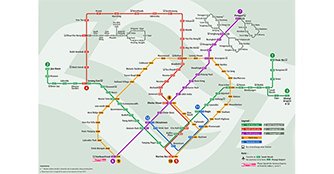Signalling issues with MRT system may continue to cause delays
27 Feb 2014|4,836 views
Signalling issues behind the recent cases of train service delay may continue to persist over the next two years. In a report by The Straits Times, rail operator SMRT explained that the overhaul of the signalling system will only be completed in 2016 at the earliest.

Spokesman for SMRT, Alina Boey, said yesterday that a signalling upgrade programme will address many of the incidents that are taking place currently, but the upgrade will only be completed in 2016 for the North-South Line and 2018 for the East-West Line.
For instance, the delay in service at Marina Bay station recently was due to a code generator fault. Code generators are responsible in managing train speeds. As such, Tuesday's incident meant that trains on the affected stretch had to run at lower speeds.
Adjunct Associate Professor of Nanyang Technological University, Gopinath Menon, links the problem to the short windows for maintenance as rail operators can only work on upgrading when the trains are offline.
He also told the local papers that the local rail network is not extensive enough for commuters to opt for a parallel route when disruptions take place. The situation will likely improve when the network grows.
Signalling issues behind the recent cases of train service delay may continue to persist over the next two years. In a report by The Straits Times, rail operator SMRT explained that the overhaul of the signalling system will only be completed in 2016 at the earliest.
Since the start of the year, SMRT has been hit by at least three incidents of faulty signalling on the North-South Line, which has led to the trains slowing down significantly.
Spokesman for SMRT, Alina Boey, said yesterday that a signalling upgrade programme will address many of the incidents that are taking place currently, but the upgrade will only be completed in 2016 for the North-South Line and 2018 for the East-West Line.
For instance, the delay in service at Marina Bay station recently was due to a code generator fault. Code generators are responsible in managing train speeds. As such, Tuesday's incident meant that trains on the affected stretch had to run at lower speeds.
Adjunct Associate Professor of Nanyang Technological University, Gopinath Menon, links the problem to the short windows for maintenance as rail operators can only work on upgrading when the trains are offline.
He also told the local papers that the local rail network is not extensive enough for commuters to opt for a parallel route when disruptions take place. The situation will likely improve when the network grows.
Latest COE Prices
January 2026 | 2nd BIDDING
NEXT TENDER: 04 Feb 2026
CAT A$109,501
CAT B$121,634
CAT C$75,202
CAT E$120,891
View Full Results Thank You For Your Subscription.


















